Unbelievable Drone Footage of Colombia's Cocora Valley
Can a place with trees nearly 200 feet tall still be hidden? The answer is yes, if you’re talking about Colombia’s Cocora Valley.
Only recently has this tropical stunner of the Andes Mountains been catching on with non-Colombians as an important adventure-travel destination, but it’s time for the sun to peek through its moody mist and get the word out: this will go down as the most pleasantly surprising hike I’ve ever taken.
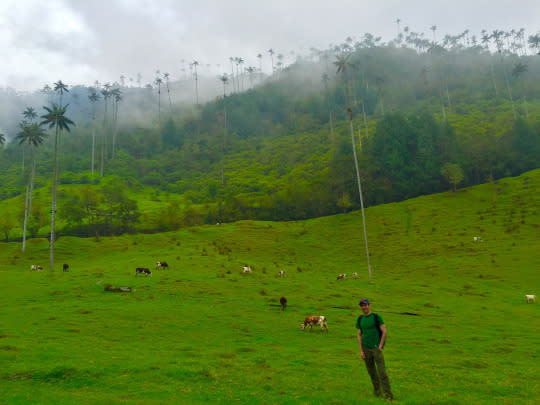
Me in the valley of the wax palms and cows near the end of the 10-mile hike. (Photo: Greg Keraghosian)
Go hiking in Cocora Valley as I did for 10 miles with over 1,400 feet of muddy elevation change, and you’ll be enchanted with each layer it reveals to you in the kind of magical realism Colombia is famous for. I lived something of a fairy tale, including the world’s tallest palm trees partially obscured by atmospheric mist, green fields whose natural color saturation beats any Instagram filter, grazing cows, farmers passing by on mules, random dogs guiding us over rickety bridges, colorful magic mushrooms, a hummingbird sanctuary, and of course, a summit with a country house where I approached white horses surrounded by flowers.
Yup, I saw all that in five hours. Without taking the mushrooms.
There’s a reason why Cocora Valley, part of Los Nevados National Forest and less than 10 miles from the coffee town of Salento, has only recently started attracting tourists. Ten years ago, it would have been too dangerous to visit – this area belonged to FARC guerillas for decades. While they’re still a concern – near the end of my hike I passed by an armed guard – I saw about two-dozen young couples and backpackers going through here this day on a tour with Intrepid Travel, and the place couldn’t have felt more tranquil.
Related: The Wonderful Secret Places You Need to See in Colombia
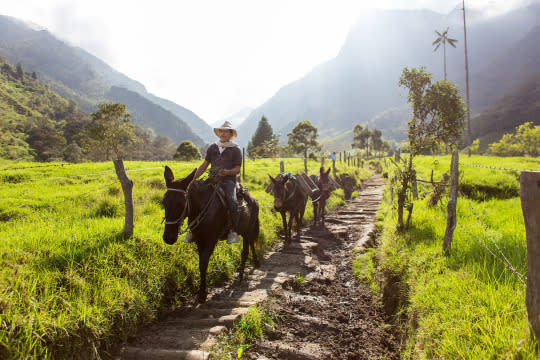
Say hi to the local farmers as you pass by. (Photo: Nathan Legiehn Photography)
Had the hike not been so captivating, I wonder if I would have lasted as long. Just hours before we arrived from Salento that morning, I had been up at night shivering from a fever, and I was practically sleepwalking through the first mile into Cocora Valley. The famous, towering wax palm trees that are a national symbol of Colombia were still off in the distance.
We hiked into the valley via a narrow, uncovered dirt path that’s bounded on both sides by farmland – occasionally we’d step aside to let farmers and their mules go by. Although I was led by a park tour guide named Carlos, after passing a trout farm we received a second guide – a beagle who led us for about two miles. Occasionally it would stop and wait for us when we fell behind. Carlos says such encounters are common – the dogs have homes here and enjoy interacting with visitors because they feed them generously. Everyone has a job here, it seems.
Related: 10 Reasons Why You Should Drop Everything and Head to Colombia
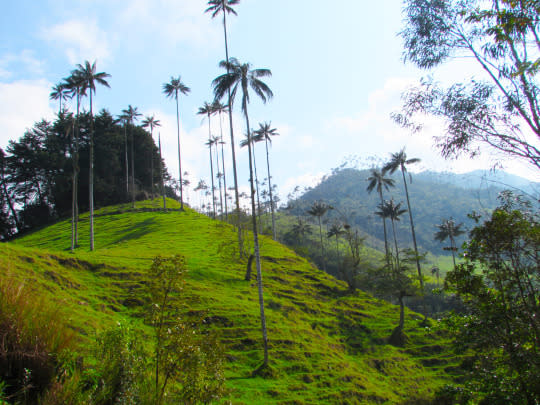
The sunny, earlier portion of our hike. Later, the wax palms were engulfed in mist. (Photo: Greg Keraghosian)
We lost our beagle friend after encountering a waterfall – now we were entering the lush tropical forest, and the scenery changed rapidly after that. Carlos told us there are black bears, pumas, and eagles in the park, though I didn’t see any of them. But on our way uphill to Acaime Natural Reserve we did spot a brilliantly plumed bird: a red masked trogon.
That’s when things started to get surreal. The sight of vividly green foliage, the sound of moisture trickling down overhanging moss, and the healthy fear of crossing several creaky suspension bridges made of wood planks all had a storybook feel to it.
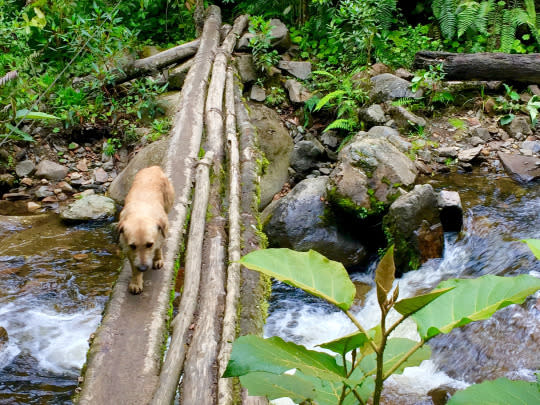
Our second doggie guide, Don Asdrubal. (Photo: Greg Keraghosian)
As our surroundings got wetter, the ground we walked on began to turn muddy and slippery – November is part of Colombia’s wet season – and despite my best attempts I would slip in the mud twice this day. But hiking pants are made to get dirty, anyway.
Related: How to Experience Gabriel García Márquez’s Colombia in 9 Magical Ways
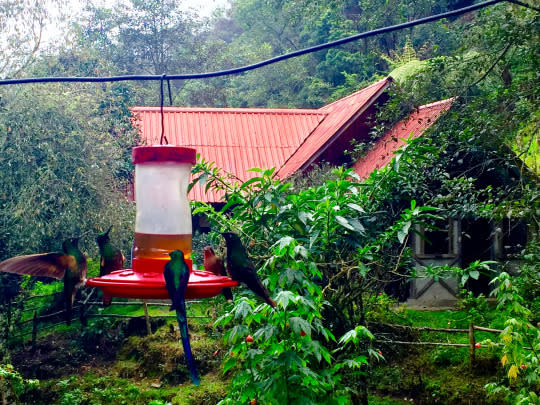
Up close with the residents of Hummingbird House. (Photo: Greg Keraghosian)
My first slip into the mud came during a strenuous series of uphill switchbacks to Acaime Natural Reserve, named after an indigenous chief from the area. You might get sore quads from the exercise, but you’ll be rewarded with a visit to La Casa de los Calibris, or Hummingbird House. About seven species of hummingbird reside here and they’re constantly stopping for sips of nectar from their feeders. I stood there almost hypnotized as one hummingbird after another swooped in and out just inches away from me.
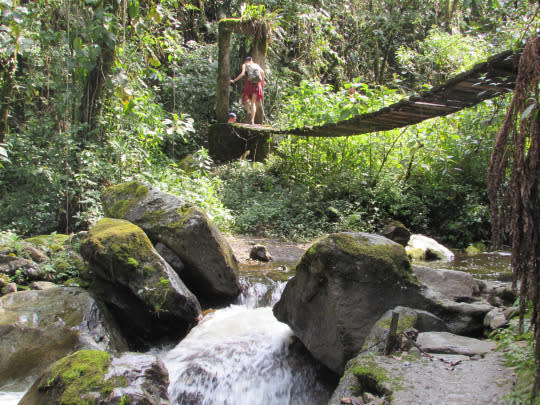
You might have to hold your breath during bridge crossings like this. (Photo: Greg Keraghosian)
While at the hummingbird house, make sure to stop for a sweet drink of your own: aguapanela, a hot drink made of hardened cane sugar, with a chunk of cheese in the cup.
During the descent, we found our next volunteer guide: a dog named Don Asdrubal, who led us over more rickety bridges and up an even steeper incline – this time to Finca la Montaña. On the way Carlos showed us a series of large, brightly colored mushrooms that are toxic if eaten raw but can be cultivated for certain recreational purposes.
Related: Is Colombia Really Safe? A Firsthand Look
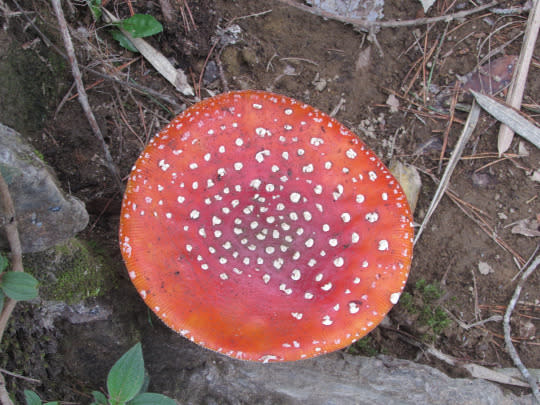
These mushrooms are not for eating. (Photo: Greg Keraghosian)
During the roughly 30-minute hike up to the finca, you’ll probably want to take some breaks. If you’re not acclimated to high altitude – and as someone who lives at sea level, I certainly was not – you’ll be sucking wind rapidly.
Related: 6 Amazing Hikes Around the World
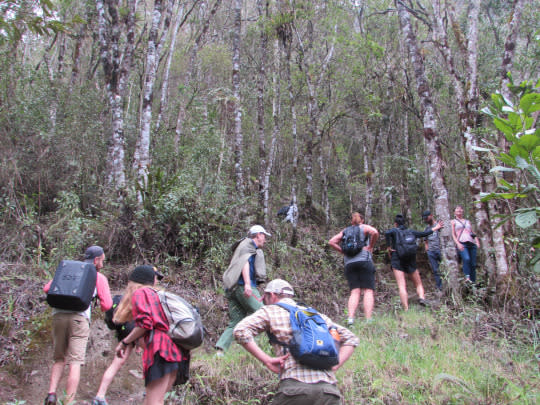
The grueling hike up to Finca la Montaña. (Photo: Greg Keraghosian)
By the time you’ve taken your final laborious steps to the top, you’ll be at over 9,300 feet, and it will be very much worth the effort. I couldn’t feel my flu at that point – I was too busy enjoying the gorgeous panoramic views of the surrounding mist-covered mountains, and the finca felt like a high-altitude garden of Eden. I played around with Don Asdrubal, and as if the Hummingbird House wasn’t magical enough, I encountered two white horses grazing in a raised garden with colorful flowers. I half-expected them to be unicorns.
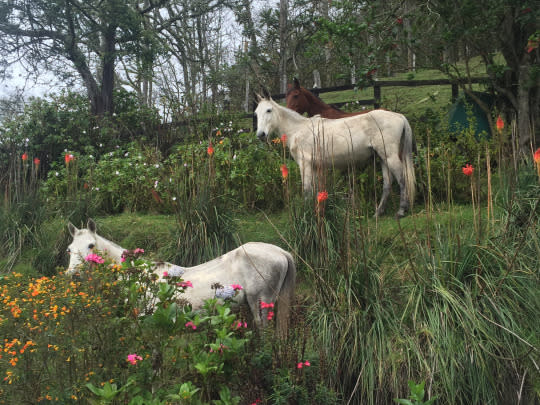
Horses and flowers intermingling at the finca. (Photo: Greg Keraghosian)
Once again the terrain changed as we then descended into the valley, which is dominated by mist-covered wax palms and grazing cows who seemed oblivious to us. It started to rain at this point, which only added to the moody atmosphere. For a while we sat in the rain on a mound of grass and just looked up in wonder at the palms.
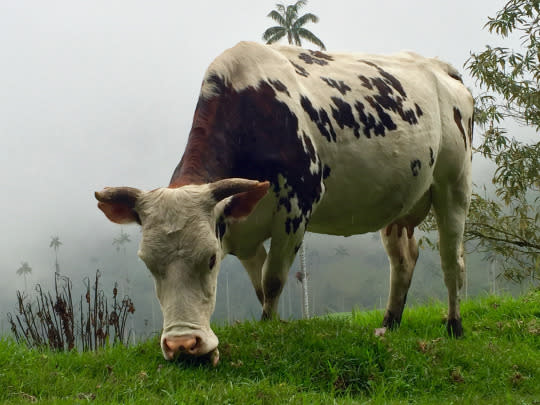
Some more moooving scenery. (Photo: Greg Keraghosian)
What’s the proper adjective to describe how green it was as I walked the final leg of the hike through the valley? Verdant? Is that a good word? Let’s go with that.
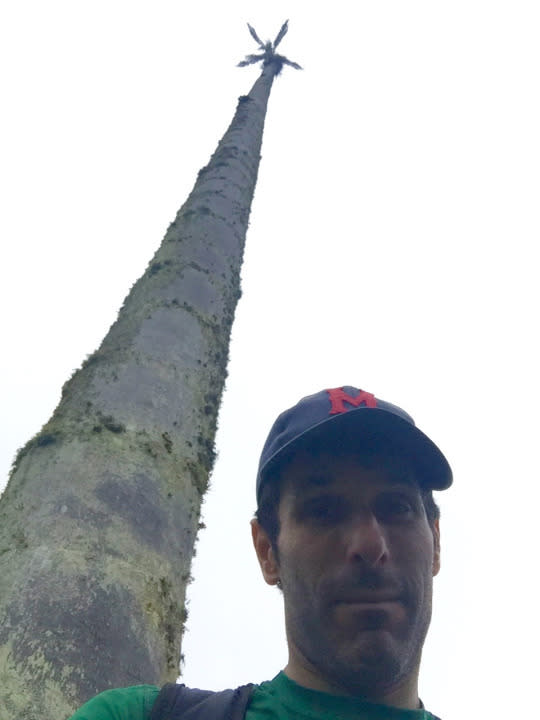
A selfie with the world’s tallest palm tree. (Photo: Greg Keraghosian)
Here’s where you’ll find the world’s tallest palm tree, standing close to 200 feet tall. From under it, I looked up at its rail-thin trunk into the grey sky, and as I stood there soaked in rain and wonder at all this timeless scenery, there was just one thing left to do before the hike was complete.
I took a selfie with the tree.
Let Yahoo Travel inspire you every day. Hang out with us on Facebook, Twitter, Instagram, and Pinterest. Check out our original adventure travel series, “A Broad Abroad.”
